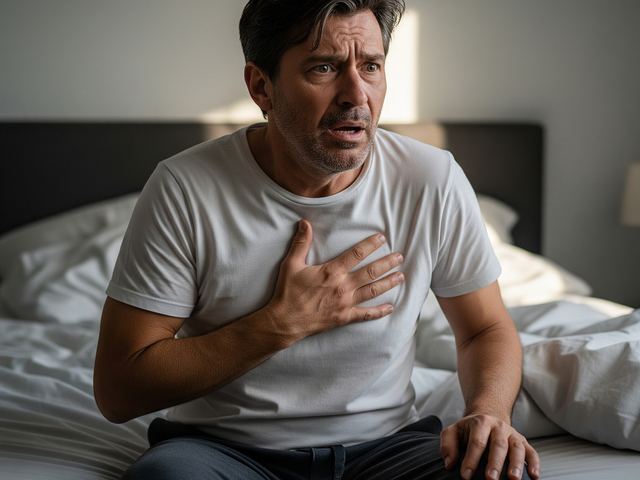The American Heart Association (AHA) says many heart attacks occur early in the morning, when blood pressure and heart rate naturally increase due to hormonal changes in the body. Some seemingly simple signs are early warning signs of potential heart disease, according to the health website Healthline (USA).

Feeling short of breath as soon as you wake up in the morning is a potential sign of heart disease.
PHOTO: AI
If you want to protect your heart health, when you wake up, you should not ignore the following signs:
Chest pain
This is a classic sign of a heart attack and often occurs in the early morning. The patient feels a feeling of pressure, tightness or sharp pain in the chest area. In many cases, the pain radiates to the arms, shoulders, back or jaw, especially on the left side of the body.
Morning heart attacks are often more severe because platelets in the blood are more active at this time, making it easier for blood clots to form. Some people mistake chest pain caused by a heart attack for heartburn or chest muscle spasms. However, chest pain caused by a heart attack will be accompanied by nausea and cold sweats. The patient needs to be taken to the emergency room immediately.
Shortness of breath after waking up
Another sign of heart disease is that the person will feel short of breath as soon as they sit up or walk a few steps out of bed. This is because the heart is not pumping blood effectively.
Morning breathlessness is often associated with congestive heart failure, which occurs when fluid builds up in the lungs, making breathing shallow and difficult. Experts say heart-related shortness of breath is often not improved by changing positions and is often accompanied by fatigue, a dry cough, or swelling in the legs.
Nervous
One of the symptoms of atrial fibrillation is the feeling of an abnormally fast, fluttering, irregular heartbeat or pounding heart immediately after waking up. Atrial fibrillation is a common heart rhythm disorder that can lead to stroke or heart failure. Symptoms of atrial fibrillation are often more noticeable in the morning due to post-wake adjustments of the autonomic nervous system.
Unusual fatigue
After a long sleep, the body will feel healthy when waking up. However, if the body is tired, it is a sign of an underlying problem, such as high stress, hormonal disorders or cardiovascular disease.
With cardiovascular disease, the cause is the heart not pumping enough blood to the organs in the body. Women are especially prone to ignoring this sign because they often do not think that fatigue is a symptom of cardiovascular disease. Patients will brush their teeth and change clothes while their body is tired and unusually heavy, according to Healthline .
Source: https://thanhnien.vn/4-dau-hieu-khi-vua-thuc-day-canh-bao-can-di-kham-tim-185250731183153213.htm







































































































Comment (0)